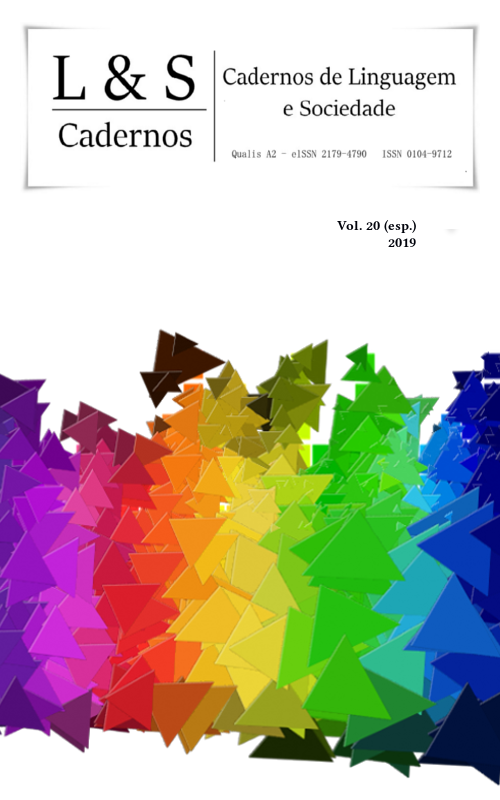A ESTRATÉGIA DE (RE)CATEGORIZAÇÃO NA INTERFACE ENTRE POLIDEZ E IMPOLIDEZ LINGUÍSTICA
DOI :
https://doi.org/10.26512/les.v20i3.28635Mots-clés :
Recategorização, Interdiscurso, Polidez, Impolidez, Coca-ColaRésumé
From the understanding that communication is established to maintain social relations and not just to inform something, many linguists have become concerned with studying the issues of politeness and impoliteness as sociated with these social manifestations of communication. In this sense, ou rresearch aimed to understand the recategorization process as na instrument of interface between polite and impolite language. From the analysis of the internal communication action promoted by the Coca-Cola company to celebrate the International LGBT Pride Day in 2017. To conduct this research, we sought to make a case study about the campaign “This Coca-Cola is Fanta. Sowhat?”. Based on the studies in the área of ”‹”‹politeness by Leech (1983), Brown and Levinson (1987), and the área of ”‹”‹gender with Butler (1990, 1993) and, in the area of ”‹”‹recategorization, with Apothéloz and Reichler-Béguelin(1995) and Jaguaribe (2007), we observed that the process of recategorization occurred in two situations: the first was in the material level from the discursive resumption of a typically offensive idiom against the LGBT group and the insertion of a new expression; The second was on the social level with the suggestion of a change in the people´s expression and attitude. Thus, we conclude that the recategorization process could not be seen, in this issue, as just a process of retaking the referent and its transformation, since, in the campaign of the soft drink brand under consideration, we realized that this process was still capable of generating a social change (beyond the pack aging of the can), thus demonstrating another level of recategorization, that is, the ability to transform a typically na impolite expression into a polite one.
Téléchargements
Références
APOTHÉLOZ, D.; REICHLER-BÉGUELIN, M.J.. Construction de la reference et strategies de designation. In: BERRENDONNER, A.; REICHLER-BEGUELIN, M.J. (Eds.). Du syntagme nominal auxobjets-de-discours: SN complexes,nominalizations, anaphores. Suisse: Institut de Linguistic de l’Université de Neuchâtel, 1995.
BOAVENTURA, E. M..Metodologia da Pesquisa: monografia, dissertação e tese. São
Paulo: Atlas, 2004.
BROWN, P.; LEVINSON, S..Politeness: some universals in language usage. Cambridge: Cambridge University Press, 1987.
BUTLER, J.. Gender trouble: Feminism and the subversion of identity. New York: Routledge, 1990.
BUTLER, J.Bodies that matter:on the discursive limits of sex. New York: Routledge, 1993.
CAVALCANTE, M. M.. O processo Cognitivo-discursivo da Referência. In: CAVALCANTE, M. M.. Referenciação: sobre coisas ditas e não ditas. Fortaleza: UFC, 2011.
CIULLA, A.. Os processos de referência e suas funções discursivas:o universo literário dos contos. 2008 201f. Tese (Doutorado em Linguística). Programa de Pós-graduação em Linguística, Universidade Federal do Ceará, Fortaleza, 2008.
CULPEPER, J.. Towards na anatomy of impoliteness.JournalofPragmaticsv. 25, p. 349-367, 1996.Disponível em:<http://dx.doi.org/10.1016/0378-2166(95)00014-3>Acesso em: 02 de agosto de 2017.
GRICE, H. P. Lógica e conversação. In: DASCAL, M. (Org.). Pragmática ”“ problemas, criticas, perspectivas da lingüística. Campinas: Edição do autor,1982.
GOFFMAN, E..Interaction ritual:essays on face-to-face behavior. Garden City: Anchor Doubleday, 1967.
JAGUARIBE, V. M. F.. Os caprichos e as condescendências do discurso literário. In: CAVALCANTE, M. M.; COSTA, M.H.A.; JAGUARIBE, V.F.; CUSTÓDIO FILHO, V. (Orgs.). Texto discurso sob múltiplos olhares: referenciação e outros domínios discursivos. v.2. Rio de Janeiro: Lucerna, 2007.
KOIKE, D.A. Os frames culturais na fala: expectativas para a (des)cortesia. In: CABRAL, A. L. T.; SEARA, I.R.; GUARANHA, M.F. (Orgs.). Descortesia e cortesia: expressão de culturas. São Paulo: Cortez, 2017.
LAKOFF, R.The logic of politeness; or, minding your P's and Q's. In: CORUM, C.; SMITH-STARK, T. C.; WEISER, A. (Eds.). Papers from the Ninth Regional Meeting of the Chicago Linguistics Society. Chicago: University of Chicago Press, p. 292-305, 1973.
LEECH, G. M..Principles of Pragmatics. London: Longman, 1983.
LOCHER, M.A.. Power and politeness in action:Disagreements in oral Communication. Language, Power and Social Process. Berlin and New York: Mouton de Gruyter, 2004.
MARLANGEON, S.K.. Contribuições para o estudo da descortesia verbal. In: CABRAL, A. L. T.; SEARA, I.R.; GUARANHA, M.F. (Orgs.). Descortesia e cortesia: expressão de culturas. São Paulo: Cortez, 2017.
OLIVEIRA, F. P. L.. Recategorização para além dos muros: a produção (inter)subjetiva de objetos de discurso no universo dos graffitis e a recriação da realidade. 2017. 284 f. Tese (Doutorado em Linguística Aplicada) Centro de Humanidades, Universidade Estadual do Ceará, Fortaleza, 2017.
PRODANOV, C. C.; FREITAS, E. C.. Metodologia do trabalho científico: Métodos e Técnicas da Pesquisa e do Trabalho Acadêmico. 2. ed. Novo Hamburgo: Feevale, 2013. Disponívelem: <www.feevale.br/editora>. Acesso em: 16 ago. 2017.
WATTS, J. R.. Politeness: key topics in sociolinguistics. Cambridge: Cambridge Press, 2004.
ZAVAM, Aurea S.. São axiológicas as anáforas encapsuladoras?. In: CAVALCANTE, Mônica Magalhães et al. (Org.). Texto e discurso sob múltiplos olhares: referenciação e outros domínios. 1ª ed.Rio de Janeiro: Lucerna, 2007, v. 2, p. 123-143.
Téléchargements
Publié-e
Comment citer
Numéro
Rubrique
Licence
Autores/as que publicam nesta revista concordam com os seguintes termos:
Autores/as mantêm os direitos autorais e concedem à revista o direito de primeira publicação, sendo o trabalho simultaneamente licenciado sob a Creative Commons Attribution 4.0 International license que permite o compartilhamento do trabalho com reconhecimento da autoria do trabalho e publicação inicial nesta revista.



